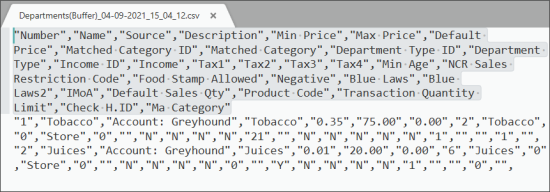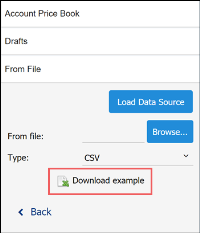With the Import Tool, you can perform the following operations with the departments:
- Copy the Price Book departments between accounts
- Import departments to the current account from the following data sources:
- Account Price Book
- GateKeeper (for more details, see Importing Data from GateKeeper).
- Location Cash Register
- Drafts
- File (for more details, see Preparing a File for Data Import)
- Export departments from the current account to a file
- Manage the account's departments
Copying Departments between Accounts
To copy the Price Book departments using the Import Tool, follow the same steps as for copying categories but for departments. For details, see Copying Categories between Accounts.
Please note that the departments are configured on the account level. So, in case the departments are exported to any location, the departments of the whole account are updated automatically as well.
Importing Departments to Current Account
To import the departments to the current account, follow the steps:
- Go to Operational Menu > Price Book and then click Departments.
- Go to DRAFTS and create a new draft. For details, see Working with Drafts List.
- Import departments to the draft from any of the available data sources:
For more information on importing data to the draft, see Importing Data to Draft.
- Account Price Book
- GateKeeper - for more details, see Importing Data from GateKeeper.
- Location Cash Register
- Drafts
- From File
- Copy the draft's data to any of the current account's locations. For details, see Exporting Draft Data.
Please note that you may need to adjust in the draft's table the names of the departments imported from the Location Cash Register as the names of the departments in the cash registers can be too long for the price book.
For more information on working with the data sources, see Importing Data from Different Sources.
The departments are configured on the account level. So, in case the departments are exported to any location, the categories of the whole account are updated automatically as well.
Exporting Departments from Current Account to a File
To export the departments from the current account to a file, follow the steps:
- Go to Operational Menu > Price Book and then click Departments.
- Go to DRAFTS and create a new draft. For details, see Working with Drafts List.
- Import departments to the draft from the Account Price Book source.
For details, see Importing Data to Draft, Import Item Tags or Promotions from Account Price Book. - Export the departments from the draft to a file. For details, see Exporting Draft Data.
Managing Account Departments
You can manage the account departments in the draft and then save this draft to any location to apply changes to the whole account. For more information on how to update the departments in the draft, see Editing Draft Manually.
Preparing a File for Data Import
You can use CSV or XLSX files to import data about Price Book departments and work with them in the Import Tool. In the file, you must provide data for all departments whose data you want to import. Each line in the file contains data for a separate Price Book department. Each entry in the line corresponds to a specific department field, and each comma indicates where one entry ends and another entry begins.
The file that you use for import of departments data must have the following structure. Non-mandatory fields can be omitted.
| Field Name | Mandatory (Yes/No) | Description |
|---|---|---|
| Number | Yes | Unique department ID. |
| Name | Yes | Department name. |
| Source | No | Source of record, can contain custom text or be left empty. |
| Description | No | Department description. |
| Min Price | No | Minimum price amount that must be applied to direct sales at the cash register. |
| Max Price | No | Maximum price amount that must be applied to direct sales at the cash register. |
| Default Price | No | Default price amount that can be applied to direct sales at the cash register. |
| Matched Category ID | No | Category ID that must be connected with the department. |
| Matched Category | No | Category name that must be connected with the department. |
| Department Type ID | No | Department
type code.
Possible Values:
- 0 = Store - 1 = Fuel - 2 = Car Wash - 3 = Not for Sale - 4 = Money Orders - 5 = Lottery Instant Sales - 6 = Lottery Instant Payouts - 7 = Lottery Online Net Sales - 8 = Other Income |
| Department Type | No | Text
representation of the department type, works in pair with the Department Type ID and
must have a text value equal to a code or be left blank.
The following values allowed:
- Store - Fuel - Car Wash - Not for Sale - Money Orders - Lottery Instant Sales - Lottery Instant Payouts - Lottery Online Net Sales - Other Income |
| Income ID | No | ID of income type. Allows a user to save income type from the file to the system list. |
| Income | No | Name of income type. Allows a user to save the income type name from the file to the system list. |
| Tax1 | No | Flag
that allows a user to apply Tax 1 to items at the cash register. Possible values:
- "1" - tax is applied - "0" - tax is not applied |
| Tax2 | No | Flag
that allows a user to apply Tax 2 to items at the cash register. Possible values:
- "1" - tax is applied - "0" - tax is not applied |
| Tax3 | No | Flag
that allows a user to apply Tax 3 to items at the cash register. Possible values:
- "1" - tax is applied - "0" - tax is not applied |
| Tax4 | No | Flag
that allows a user to apply Tax 4 to items at the cash register. Possible values:
- "1" - tax is applied - "0" - tax is not applied |
| Min Age | No | Minimum customer's age that is required to sell items. |
| NCR Sales Restriction Code | No | Specific for NCR (National Cash Register) sales restriction code. Possible values: - Prompt for price Tender 1 Restricted Tender 2 Restricted Tender 3 Restricted Tender 4 Restricted Tender 5 Restricted Tender 6 Restricted Tender 7 Restricted Tender 8 Restricted Tender 9 Restricted Non-discountable Non-lockable No Price Overrides |
| Food Stamp Allowed | No | Flag
that allows a customer to use food stamps as a method of payment. Possible values:
- "1" - allowed - "0" - not allowed |
| Neg | No | Flag that allows a user to set up the item price as payout from the cash register (for example, Lottery payments to the customer). |
| Blue Laws | No | Allows
a user to manage flags at the cash register. Indicates the rule applied:
- "0" - No - "1" - Yes |
| Blue Laws2 | No | |
| CMA | No | Flag
that indicates the cost method of accounting for the department
. Possible values: - "0" - No - "1" - Yes |
| Default Sales Qty | No | Default sales quantity for the item. |
| Product Code | No | Product code for this department that is sent to the cash register. Applies to locations selected on export. |
| Check H.ID | No | Sign indicating that it is necessary to verify the buyer's ID before the
sale.
Possible values: - "1" - Yes - "0" - No |
| Transaction Quantity Limit | No | The maximum quantity of items which can be sold in one transaction. Possible values: - Empty - Certain number |
| GL # | No | General Ledger number that is assigned to the department. |
| Ma Category | No | Department Matched Category |
File Template
To construct a file for import, you can use a template provided by Petrosoft. To get the template and prepare the file, follow the steps:
- In the Import Tool, on the Data Sources panel, select From file.
- Click the Download example link.
- The downloaded file is provided in the XLSX format:
- On the Fields Description tab, get information about every entry that must be filled in the file.
- On the csvDepartmentsDatasourceTemplate tab, fill data for the departments that you want to import.
- Once the file is ready, switch to the csvDepartmentsDatasourceTemplate tab and save the file in the CSV or XLSX format.
Result: You can use the saved file for import.



